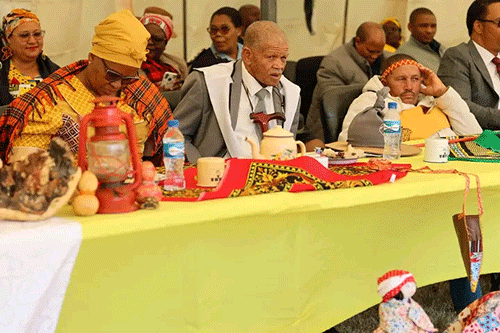Suzith Tjitaura
KEETMANSHOOP – The Nama Traditional Leaders Association’s chairperson, chief Johannes Isaack, has said the association rejects the Cabinet’s declaration of 28 May as Genocide Remembrance Day.
Isaack made these remarks during the official opening of the 2024 Nama Cultural Festival on Friday, where he said NTLA’s rejection of the day is based on its exclusion of the remembrance of those killed outside the concentration camps.
Last week, Cabinet announced that from next year, 28 May will be a public holiday to commemorate Genocide Remembrance Day. On 28 May 1908, all concentration camps in Namibia were ordered to be closed, marking the official and formal closure of the OvaHerero and Nama genocide episodes.
Isaack said genocide in Namibia started in April 1893, and they believe that Genocide Remembrance Day should be 12 April, and not 28 May as declared by the government.“We cannot betray our ancestors who were killed outside of the concentration camps, and at the same time tell untruths to future generations. The genocide in Namibia began on 12 April 1893, and for the NTLA, every precious life lost during the genocidal acts of imperial Germany must be accounted for with a comprehensive reparations package,” he said.
The chief added that their ancestors were attached to their traditional and inherited customs and manners, adding that the customary laws took their origins from decided cases by the council, ratified by the gaob, and also from customs developed in time into accepted rules of life and binding to the Nama people.
“For the Nama nation, our ancestors said gaob or gaos are not made; they are God given and the system of government by the leader is on democratic lines, even if it is not always popular.
Our past, present and future are linked, and we must learn from past mistakes and understand the present in ways that orient us to the future,” said Isaack.
He took the opportunity to urge Namibians to participate in safe, free, and fair Presidential and National Assembly elections scheduled for November this year, saying he trusts the electorate will vote for shared values and consequential leadership.
Isaack said NTLA will engage all stakeholders on the oil and gas discoveries and the envisaged green hydrogen project, to ensure all the Nama people benefit from natural resources found in their ancestral land.
The festival, being held under the theme ‘|Gi!naxasib!oa da ra ||gu’, which means ‘We are striving for unity’, started on Thursday and ended Sunday.
Unity
During the festival, chairperson of the Nama Cultural Festival organising committee Dawid Eigub said culture is an important instrument for unifying the Nama people, reshaping society, and transferring indigenous knowledge to the younger generation.
“With this festival, we want to create a platform where we can discuss how to return to the path that will take us in the right direction. Nama people should be connected to the land that they came from; they should be connected to the creato to one another; we must reconnect to the indigenous cultural systems we used to deal with the issues of society.”
Eigub said the festival is one of the platforms where the committee can slowly introduce new habits to the Nama people to ensure they become active players in the development of the region.
“We need to let go of our old habits and take up new ones, and also, by means of this platform, we want the Nama people to take ownership of the new developments such as green hydrogen, oil and gas that are in the Nama land so that we can spearhead our own development. We have to unite with our identity, reclaim our land, and benefit from our resources,” said the leader.
He called on the Nama community to stand and work together, saying there is no time for them to fight each other, but they should hold hands, move forward and ensure development takes place.
Also speaking at the ceremony was the leader and chief change campaigner of the Landless People’s Movement, Bernardus Swartbooi, who said the festival should be a platform that generates ideas for the betterment of the Nama people.
“Let us not celebrate the wrong things. Let us not fester and remain in poverty. The economic situation of this area and of this community is something that can easily be turned around if the principle of justice is respected, and if the human rights of this community are respected.
We came from the colonial government to a free government. However, the system remained exactly the same oppressive system,” he stressed.
-Nampa


